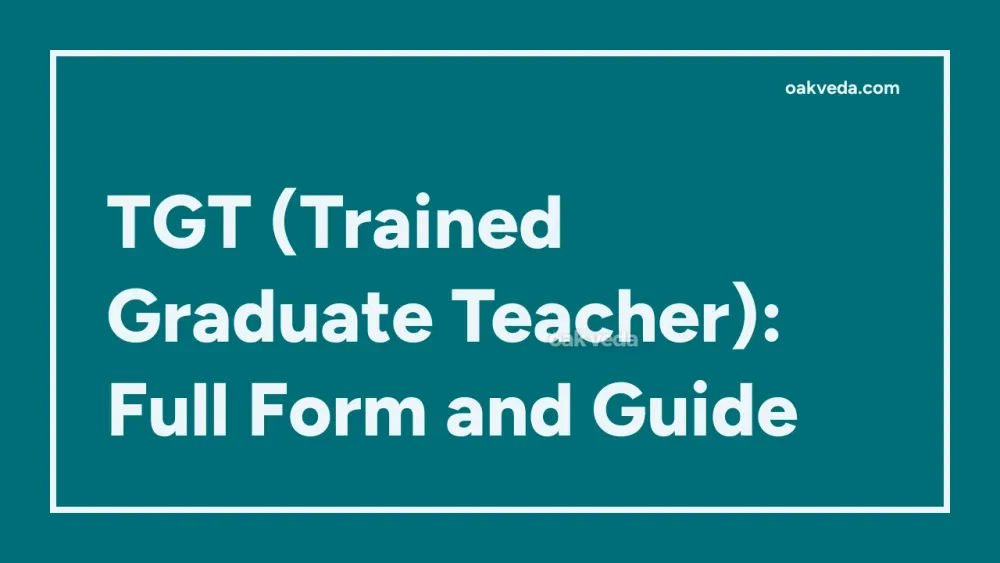
What is the Full Form of TGT?
The full form of TGT is Trained Graduate Teacher. This designation is commonly used in the Indian education system to refer to qualified educators who have completed their graduate studies and received professional teacher training.
What is a Trained Graduate Teacher?
A Trained Graduate Teacher (TGT) is an educator who has earned a bachelor's degree and completed a professional teaching qualification, typically a Bachelor of Education (B.Ed.) degree. TGTs are equipped with the necessary knowledge and skills to teach students up to the 10th grade in various subjects.
Origin and Development of Trained Graduate Teachers
The concept of Trained Graduate Teachers emerged as part of India's efforts to improve the quality of education and ensure that teachers possess both subject knowledge and pedagogical skills. The development of this category of teachers has been instrumental in standardizing teacher qualifications and enhancing the overall educational experience for students.
How does the TGT System Work?
The TGT system works by ensuring that teachers have the appropriate qualifications to provide quality education at the secondary level. Here's an overview of how it functions:
- Qualification: Candidates must complete a bachelor's degree in their chosen subject area.
- Teacher Training: After graduation, aspiring TGTs must obtain a B.Ed. degree or equivalent teaching qualification.
- Recruitment: Schools and educational institutions hire TGTs through various selection processes, including written exams and interviews.
- Teaching Responsibilities: TGTs are assigned to teach students from 6th to 10th grade in their specialized subjects.
Types of Trained Graduate Teachers
While TGT is a general category, there are various specializations based on the subjects taught:
- TGT English
- TGT Mathematics
- TGT Science
- TGT Social Studies
- TGT Hindi or Regional Languages
- TGT Physical Education
- TGT Art Education
Functions of Trained Graduate Teachers
TGTs play a crucial role in the education system by performing the following functions:
- Classroom Instruction: Delivering subject-specific lessons to students from 6th to 10th grade.
- Curriculum Implementation: Adapting and implementing the prescribed curriculum effectively.
- Student Assessment: Evaluating student performance through various assessment methods.
- Mentoring: Providing guidance and support to students for their academic and personal growth.
- Extracurricular Activities: Organizing and supervising co-curricular activities to promote holistic development.
Applications of the TGT Role
The TGT designation finds applications in various educational settings:
- Government Schools: TGTs are widely employed in state-run schools across India.
- Private Schools: Many private institutions hire TGTs to maintain high teaching standards.
- Kendriya Vidyalayas: These central government schools employ TGTs for secondary education.
- Navodaya Vidyalayas: TGTs play a vital role in these residential schools for gifted students.
- Education Boards: TGTs may be involved in curriculum development and assessment for various education boards.
Features of the TGT Position
The TGT position comes with several distinctive features:
- Subject Specialization: TGTs are experts in specific subject areas.
- Age-appropriate Teaching: They are trained to teach adolescents and pre-teens effectively.
- Continuous Professional Development: TGTs are expected to update their skills regularly.
- Career Progression: There are opportunities for advancement to higher teaching positions.
- Standardized Qualifications: The TGT designation ensures a minimum standard of teacher quality.
Benefits of Being a Trained Graduate Teacher
Pursuing a career as a TGT offers several advantages:
- Job Security: Government schools provide stable employment opportunities.
- Competitive Salary: TGTs receive attractive pay packages, especially in government institutions.
- Respect in Society: Teachers are highly regarded in Indian society.
- Work-Life Balance: Teaching often offers favorable working hours and vacation periods.
- Personal Growth: The role provides opportunities for continuous learning and skill development.
Limitations or Challenges of the TGT Role
While rewarding, the TGT position also faces certain challenges:
- Limited to Secondary Education: TGTs cannot teach higher secondary classes without further qualifications.
- Competitive Selection Process: Securing a TGT position, especially in government schools, can be highly competitive.
- Evolving Education Landscape: TGTs must adapt to changing teaching methodologies and technologies.
- Student Management: Dealing with diverse student needs and behaviors can be challenging.
- Resource Constraints: Some schools may lack adequate teaching resources and infrastructure.
Future Developments in TGT Education
The field of teacher education is continuously evolving. Some potential future developments for TGTs include:
- Integration of Technology: Increased focus on digital literacy and online teaching skills.
- Emphasis on Soft Skills: Greater importance placed on developing students' critical thinking and problem-solving abilities.
- Specialized Training: Additional certifications in areas like special education or counseling.
- Research-oriented Approach: Encouraging TGTs to engage in educational research and innovation.
- Global Perspective: Incorporating international best practices in teacher training programs.
FAQs on TGT Full Form
-
What is the eligibility criteria for becoming a TGT? To become a TGT, candidates must have a bachelor's degree in the relevant subject and a B.Ed. degree. The maximum age limit is typically 35 years, but this may vary depending on the recruiting organization.
-
Can a TGT teach in higher secondary classes? No, TGTs are qualified to teach up to 10th grade. For teaching higher secondary classes (11th and 12th), one needs to be a PGT (Post Graduate Teacher).
-
What subjects can a TGT teach? TGTs can teach subjects like English, Hindi, Mathematics, Science, Social Studies, and other regional languages, depending on their specialization.
-
Is there a difference between a TGT and a PGT? Yes, TGTs are qualified to teach up to 10th grade, while PGTs (Post Graduate Teachers) have a postgraduate degree and can teach 11th and 12th grades.
-
How can a TGT advance in their career? TGTs can progress by obtaining higher qualifications like a master's degree to become a PGT, or by taking on administrative roles within the school system.
By understanding the full form and implications of the TGT designation, aspiring educators can make informed decisions about their career paths in the teaching profession.
You may be interested in:

